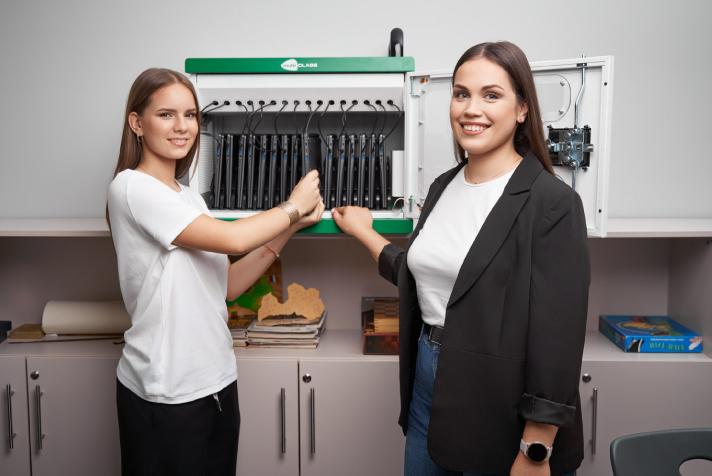
Like all EU countries, Latvia is grappling with challenges linked to an increasingly digital world. To address these, the country is devoting nearly one quarter of its NextGenerationEU funding to powering the digital transition. Among the major issues Latvia faces is a concerning digital divide, which one nationwide initiative has sought to tackle through the procurement and distribution of 35,000 laptops to secondary schools across the country.
The project aims to address the issue of access to learning opportunities through technology, a problem affecting some citizens disproportionately, for socioeconomic reasons, among others. The Jelgava State Gymnasium upper-secondary school (the oldest of its kind in Latvia) is among the facilities to benefit from the scheme, having received 274 laptops for use by students and teachers alike. The institution’s staff has broadly praised the initiative.
Zaiga Atelbauere, who teaches English and business management, and Nadīna Anija Poga, a professor in IT, design and technology studies, shared their thoughts.
Has this project been significant for Jelgava State Gymnasium?
ZA: I think so. When it comes to methodologies and technology, our school prides itself on being practical; on developing students’ skills to prepare them for the real world and the labour market. Digitalisation is essential, but some social groups are at a disadvantage in terms of access. We like to establish a level playing field as much as possible, seeking to provide quality, up-to-date technology for all. Initiatives like these make this feasible.
NAP: It’s made a huge difference to how our students work and learn. The laptops are used across various subjects, including English and natural sciences. Teachers have integrated the computers into their lesson plans, and they can request access to them for either their own or students’ use during class, using them to assign tasks and work digitally with pupils.
“We like to establish a level playing field as much as possible... Initiatives like these make this feasible.”
– Zaiga Atelbauere, Teacher at Jelgava State Gymnasium
What have been some of the project’s standout benefits?
ZA: We've all become more efficient, I think, and we print much less paper than before. It's interesting to observe the digital skills that students pick up almost effortlessly. Thanks to the computers, they can work both autonomously and collaboratively, engaging with each other in a non-disruptive manner. We also get a lot more done during class, avoiding excessive homework assignments. All pupils work on topics using the same means, with a teacher at hand to assist in person.
NAP: The students are developing skills they can apply across different subjects. For example, they've been perfecting their Excel skills in their computer science classes, which has helped them with research projects, particularly when it comes to making calculations or presenting data. For group work, it has also been very useful, as it really enables collaboration. Previously, they searched for information on their phones and were often distracted by notifications. The laptops are more convenient and there are no notifications to hinder their concentration.
“Digitalisation is essential for schools and learning outcomes going forward, as it reflects the world in which we live today.”
– Nadīna Anija Poga, Teacher at Jelgava State Gymnasium
Do you think initiatives like this are the way forward?
ZA: Most certainly. The digital skills that students acquire today will be beneficial to them as they progress in life. Schools need to facilitate this. Digital skills are vital for any kind of engagement with contemporary society and this only stands to intensify going forward. Rolling out such an initiative at national level is important, as it acts as a great equaliser, both geographically and socially.
NAP: I agree. Digitalisation is essential for schools and learning outcomes going forward, as it reflects the world in which we live today. This project has provided a considerable opportunity for schools and teachers in Latvia to integrate digital processes into their teaching and learning methods. That said, the success of this initiative will ultimately depend on teachers' ability to effectively implement them. Providing schools with material resources is only the beginning.
Distributing laptops to schools across Latvia is one of many digitalisation initiatives undertaken with the help of NextGenerationEU funding. Efforts to bridge the digital divide underpin many of the country's projects to modernise technological infrastructure and upskill the wider population, with public administration, SMEs and internet connectivity programmes also receiving sizeable grants. By enthusiastically pursuing its digital transition in this way, Latvia aims to equip its citizens today to face an ever more digital tomorrow.
Details
- Publication date
- 25 October 2024
- Author
- Directorate-General for Communication
- Location
- Latvia
